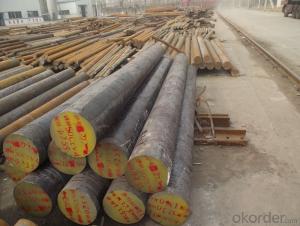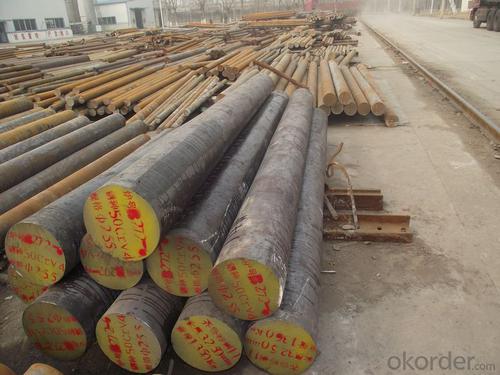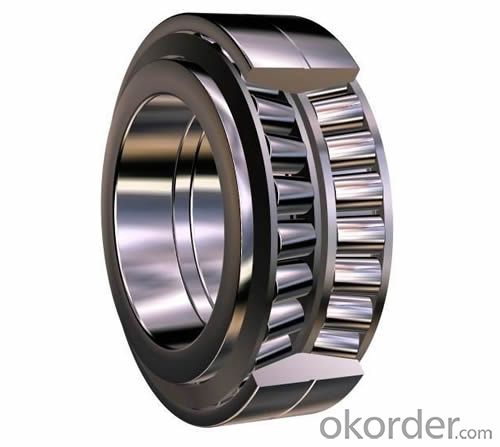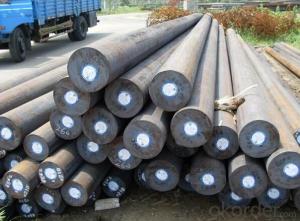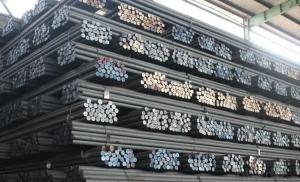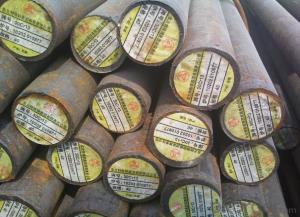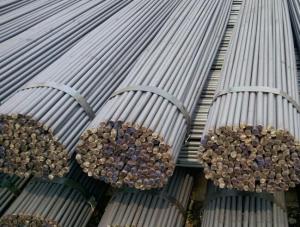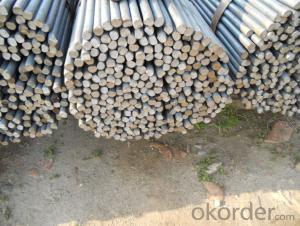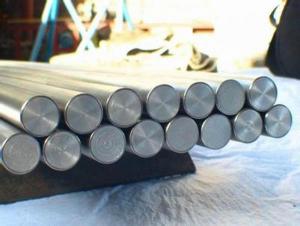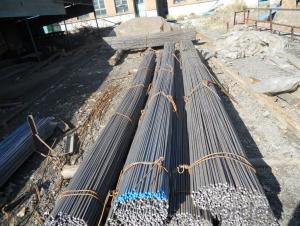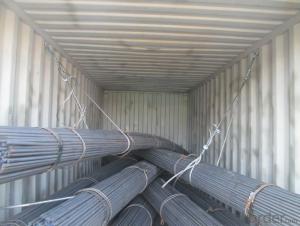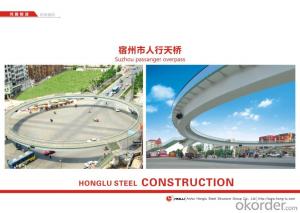Galvanized round bar structure steel made in China
- Loading Port:
- Tianjin
- Payment Terms:
- TT or LC
- Min Order Qty:
- 10000 m.t.
- Supply Capability:
- 10000 m.t./month
OKorder Service Pledge
OKorder Financial Service
You Might Also Like
Product Description:
OKorder is offering Galvanized round bar structure steel made in China at great prices with worldwide shipping. Our supplier is a world-class manufacturer of steel, with our products utilized the world over. OKorder annually supplies products to European, North American and Asian markets. We provide quotations within 24 hours of receiving an inquiry and guarantee competitive prices.
Product Applications:
Galvanized round bar structure steel made in China are ideal for structural applications and are widely used in the construction of buildings and bridges, and the manufacturing, petrochemical, and transportation industries.
Product Advantages:
OKorder's round bar structure steel are durable, strong, and resist corrosion.
Main Product Features:
· Premium quality
· Prompt delivery & seaworthy packing (30 days after receiving deposit)
· Corrosion resistance
· Can be recycled and reused
· Mill test certification
· Professional Service
· Competitive pricing
Product Specifications:
Grade | AISI 52100, ASTM E52100, DIN 1.3505,JIS SUJ2, GCr15 |
Dimensions | Diameter: 30-60mm Length: 2000-13000mm or as required |
Shape | Round Bar |
Type | Alloy Steel Bar |
Delivery Condition | Black Surface |
Material | Bearing Steel |
Technique | Hot Rolled |
Usage and Applications of Bearing Steel Round Bar
Bearing steels are used for ball and roller bearing applications and are comprised of low carbon steels and high carbon through harden able steel.
First the famous 1C-1.5Cr steel from which the majority of bearings are made. Its structure is apparently well-understood and the focus is on purity in order to avoid inclusions which initiate fatigue during rolling contact. Then there is the M50 steel and its variants, from which bearings which serve at slightly higher temperatures in aeroengines are manufactured, based on secondary-hardened martensite.
Tapered roller bearing are generally used to support combined load mainly consisting of radial load. Their cups are separable for easy assembling ,During mounting and using, radial clearance and axial clearance can be adjusted and preloaded mounting can be made.
Packaging & Delivery of Bearing Steel Round Bar
Packaging Detail: ASTM 52100 Steel in seaworthy packing or on customer request; Packed in bundles with standard export sea-worthy package or as customer require
Delivery Detail: 45 days after confirmed
Trade terms: FOB, CFR, CIF ou as customer's required
MOQ: 25 tons or at customer's demands. If the quantity is good, the price will be better.
Processing of Bearing Steel Round Bar
The processing of Bearing Steel Round Bar is hot rolled (strictly control sulphur, phosphorus and non-metallic inclusions content and distribution)
Chemical Composition of Bearing Steel Round Bar
C | Si | Mn | Cr | Ni | Cu |
Equal or less than | |||||
0.95-1.05 | 0.15-0.35 | 0.25-0.45 | Cr:1.40-1.65 | 0.30 | 0.25 |
All products' chemical composition and specification can be design according to customers' requirement.
Note of Bearing Steel Round Bar
1. According to national standard (GB) for our products, if not, supply according to national standards (GB) or agreement.
2. We can not only provide electric furnace +LF+VD and electros lag re-melting (ESR) steel forging materials, but also forging products of piece, bar, etc.
3. Our company is equipped with roll equipment and can provide our customers with roll billets or finished.
4. Please send us your detailed specifications when inquire. We will reply to you ASAP.
5. Certificate of quality is issued in English, in addition the normal terms, production process, the mechanical property (yield strength, tensile strength, elongation and hardness. forged ratio, UT test result, Grain size, heat treatment methods and the sample of is shown on the certificate
FAQ:
Q1: How soon can we receive the product after purchase?
A1: Within three days of placing an order, we will begin production. The specific shipping date is dependent upon international and government factors, but is typically 7 to 10 workdays.
Q2: What makes stainless steel stainless?
A2: Stainless steel must contain at least 10.5 % chromium. It is this element that reacts with the oxygen in the air to form a complex chrome-oxide surface layer that is invisible but strong enough to prevent further oxygen from "staining" (rusting) the surface. Higher levels of chromium and the addition of other alloying elements such as nickel and molybdenum enhance this surface layer and improve the corrosion resistance of the stainless material.
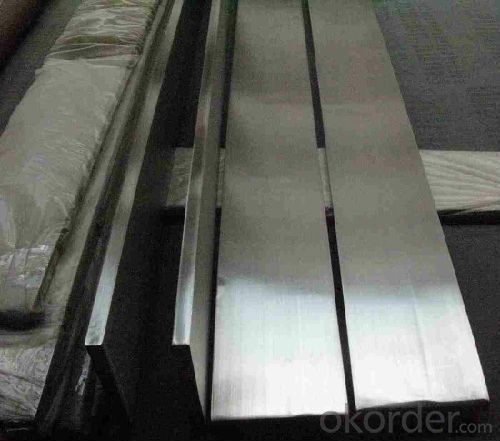
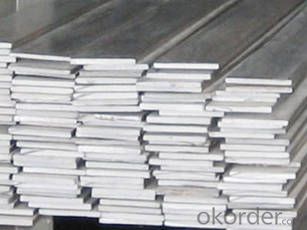
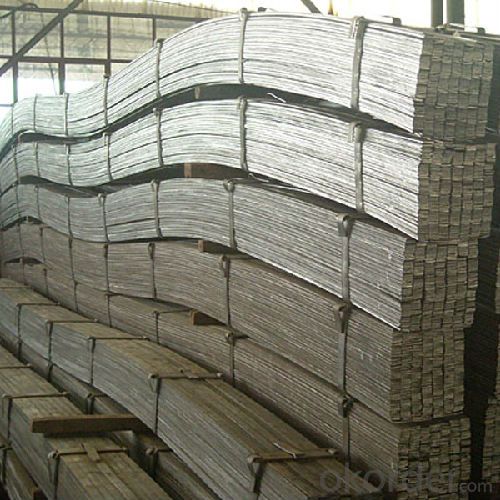
- Q: How does special steel contribute to the manufacturing of medical implants?
- Special steel plays a crucial role in the manufacturing of medical implants due to its unique properties and characteristics. Medical implants require materials that are biocompatible, corrosion-resistant, and durable. Special steels, such as stainless steel, titanium alloys, and cobalt-chromium alloys, possess these desired qualities, making them ideal for medical implant production. Firstly, stainless steel is widely used in the manufacturing of medical implants due to its excellent corrosion resistance and high strength. It is often employed in applications like surgical instruments, orthopedic implants, and dental devices. Stainless steel implants can withstand the harsh physiological environment within the body, ensuring long-term performance and reducing the risk of complications. Titanium alloys are another type of special steel extensively used in medical implant manufacturing. These alloys offer high strength-to-weight ratio, exceptional biocompatibility, and resistance to corrosion. Titanium implants are commonly used in orthopedic surgeries, such as joint replacements, as well as dental implants. The biocompatible nature of titanium allows for better integration with the surrounding bone, promoting faster healing and reducing the risk of rejection. Cobalt-chromium alloys are yet another type of special steel utilized in the production of medical implants. These alloys possess excellent mechanical strength, wear resistance, and biocompatibility. Cobalt-chromium implants are frequently employed in orthopedic surgeries and cardiovascular interventions, such as stents. Their high strength ensures stability and longevity, while their biocompatibility minimizes adverse reactions and promotes patient recovery. Overall, special steel provides the necessary qualities required for manufacturing medical implants. Whether it is stainless steel, titanium alloys, or cobalt-chromium alloys, these materials contribute to the development of biocompatible, corrosion-resistant, and durable implants that improve patients' quality of life and ensure successful medical procedures.
- Q: What are the main applications of special steel in the mining exploration?
- Special steel has various applications in mining exploration, primarily due to its exceptional strength, durability, and resistance to corrosion. It is commonly used in the construction of drilling equipment, such as drill bits and drill rods, which require high toughness and wear resistance to withstand the harsh conditions encountered during mining operations. Special steel is also utilized in the manufacturing of conveyor systems, crushers, and screens used in the processing of mined materials. Additionally, it is employed in the construction of mining infrastructure, including support structures, shafts, and tunnels, where its high strength and resistance to deformation are crucial for safety and efficiency.
- Q: What are the properties of case-hardening steel?
- Case-hardening steel is a type of steel that possesses surface hardness and wear resistance while maintaining a relatively soft and tough interior. It is achieved by introducing carbon into the outer layer of the steel through a process called carburization, which forms a hardened case. The core of the steel remains relatively softer, providing toughness and resistance to impact. This combination of properties makes case-hardening steel ideal for applications requiring a hard and durable outer surface, such as gears, bearings, and tools.
- Q: How is special steel used in the production of automotive parts?
- Special steel is commonly used in the production of automotive parts due to its exceptional strength, durability, and resistance to wear and corrosion. It is utilized in various components such as engine components, transmission gears, axles, suspension systems, and chassis parts. The use of special steel ensures that automotive parts can withstand extreme conditions and heavy loads, thereby enhancing the overall performance and safety of vehicles.
- Q: Can special steel be used in the aerospace industry?
- Yes, special steel can be used in the aerospace industry. Special steel alloys, such as stainless steel and titanium alloys, possess excellent strength, corrosion resistance, and heat resistance properties required for aircraft components. These materials are commonly used in critical applications like engine parts, landing gears, and structural components to ensure high performance and safety in aerospace operations.
- Q: What are the specific requirements for special steel used in the textile machinery industry?
- The specific requirements for special steel used in the textile machinery industry can vary depending on the specific application and machinery involved. However, there are some general requirements that are common in this industry. 1. Corrosion resistance: Textile machinery is often exposed to moisture, chemicals, and other corrosive substances. Therefore, the special steel used in this industry must have excellent corrosion resistance properties to ensure durability and longevity. 2. High strength: Textile machinery operates under high loads and stresses. Hence, the special steel used must have high strength to withstand these forces and prevent any deformation or failure. 3. Wear resistance: Textile machinery involves constant contact between different components, resulting in wear and tear. Therefore, the special steel used should have good wear resistance properties to minimize the effects of friction and prolong the lifespan of the machinery. 4. Heat resistance: Textile machinery often operates at high temperatures due to the friction generated during the manufacturing process. The special steel used should have excellent heat resistance to prevent any deformation or loss of mechanical properties under high temperature conditions. 5. Machinability: The special steel used in the textile machinery industry should be easily machinable to allow for the production of complex components with precise dimensions. This ensures that the machinery operates smoothly and efficiently. 6. Cost-effectiveness: While meeting all the above requirements, it is essential for the special steel used in the textile machinery industry to be cost-effective. Manufacturers aim to balance the performance and cost to ensure that the machinery remains competitive in the market without compromising on quality. It is important to note that these requirements can vary depending on the specific application within the textile machinery industry. Therefore, it is crucial for manufacturers and engineers to carefully evaluate the requirements of their machinery and select the appropriate special steel accordingly.
- Q: What are the different grades of special steel?
- There are various grades of special steel, including stainless steel grades such as 304, 316, and 410, tool steel grades like D2, A2, and M2, and high-speed steel grades such as M42 and T15. Each grade has unique properties and applications, making them suitable for specific purposes in industries like construction, automotive, and manufacturing.
- Q: What are the properties of corrosion-resistant stainless steel?
- Corrosion-resistant stainless steel has several key properties. Firstly, it has a high level of chromium content, typically around 10-20%, which forms a protective oxide layer on the surface of the steel. This oxide layer acts as a barrier, preventing oxygen and moisture from reaching the underlying metal and causing corrosion. Additionally, stainless steel contains other alloying elements such as nickel, molybdenum, and nitrogen, which further enhance its corrosion resistance. These alloys help to stabilize the oxide layer and make it more resistant to corrosion by aggressive substances such as acids, salts, and chlorides. Furthermore, stainless steel is highly durable and has excellent strength, making it suitable for various applications in corrosive environments, including marine, chemical, and food processing industries.
- Q: How does special steel perform in welding applications?
- Special steel, also known as alloy steel, performs exceptionally well in welding applications. Its unique composition, which includes various alloying elements such as manganese, chromium, and nickel, enhances its weldability and overall performance. The addition of these alloying elements significantly improves the strength, hardness, and corrosion resistance of the steel, making it highly suitable for welding applications. Special steel possesses excellent weldability, allowing for easy fusion and formation of strong and durable weld joints. Furthermore, the alloying elements in special steel also contribute to its heat resistance, making it capable of withstanding high temperatures during the welding process without losing its structural integrity. This property is particularly crucial in applications where welding involves high heat levels or prolonged exposure to extreme temperatures. Moreover, special steel exhibits good ductility and toughness, enabling it to withstand the stresses and strains associated with welding. It can effectively absorb and disperse heat during the welding process, minimizing the risk of distortion or cracking in the welded joints. In addition to its mechanical properties, special steel also offers excellent resistance to corrosion and oxidation. This makes it highly suitable for welding applications in environments where exposure to moisture, chemicals, or harsh weather conditions is a concern. The corrosion resistance of special steel ensures that the welded joints maintain their strength and integrity over time, even in challenging environmental conditions. Overall, the performance of special steel in welding applications is outstanding, owing to its excellent weldability, strength, heat resistance, and corrosion resistance. Its unique composition and properties make it a preferred choice for a wide range of welding projects, including structural fabrication, pipeline construction, automotive manufacturing, and many more.
- Q: How is special steel used in the production of springs?
- Special steel is used in the production of springs due to its unique properties that make it ideal for withstanding high stress and maintaining elasticity. The high strength and excellent fatigue resistance of special steel allow springs to endure repetitive loading without deformation or failure. Additionally, the specific composition of special steel can be tailored to meet desired characteristics such as corrosion resistance, heat resistance, or electrical conductivity, making it highly versatile for various spring applications across industries.
Send your message to us
Galvanized round bar structure steel made in China
- Loading Port:
- Tianjin
- Payment Terms:
- TT or LC
- Min Order Qty:
- 10000 m.t.
- Supply Capability:
- 10000 m.t./month
OKorder Service Pledge
OKorder Financial Service
Similar products
Hot products
Hot Searches
Related keywords
